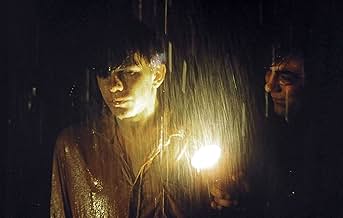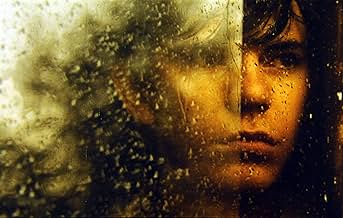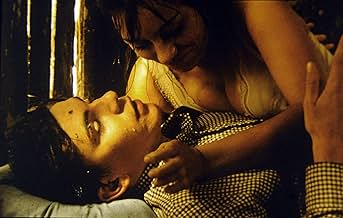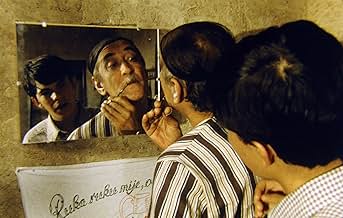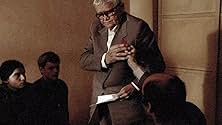IMDb RATING
7.5/10
7.1K
YOUR RATING
A young man's personality is shaped, involving some weird happenings around.A young man's personality is shaped, involving some weird happenings around.A young man's personality is shaped, involving some weird happenings around.
- Director
- Writers
- Stars
- Awards
- 9 wins & 1 nomination total
Pavle Vuisic
- Tetak
- (as Pavle Vujisic)
Zivko 'Zika' Ristic
- Cica
- (as Zika Ristic)
- Director
- Writers
- All cast & crew
- Production, box office & more at IMDbPro
Featured reviews
whichever corner of the balkans is called home, it is all but unuarguable that Kusturica is the region's greatest filmmaker. i have enjoyed all of his films - most especially "Otac na sluzbenom putu" and "Underground" - but none disturbed me quite like this one disturbed me.
the reason is that he portrays a (former) Yugoslavia i do not know, and have never known. both my parents fled the "acceptable face of communism" during the very years this film shows almost nostalgically. they were roughly the same age as the main character, yet their experience of Tito's paradise was completely and utterly apposite to what Kusturica shows on the screen. the world they knew was one of deprivation and disappearances and harassment and they could not get away from it fast enough.
i am not saying either viewpoint is right or wrong. i just find it eye-openingly disturbing that the same place at the same time can be remembered in such radically different ways.
i believe there is a lesson in that for all of us, especially those of us whose roots lie in the balkans.
the reason is that he portrays a (former) Yugoslavia i do not know, and have never known. both my parents fled the "acceptable face of communism" during the very years this film shows almost nostalgically. they were roughly the same age as the main character, yet their experience of Tito's paradise was completely and utterly apposite to what Kusturica shows on the screen. the world they knew was one of deprivation and disappearances and harassment and they could not get away from it fast enough.
i am not saying either viewpoint is right or wrong. i just find it eye-openingly disturbing that the same place at the same time can be remembered in such radically different ways.
i believe there is a lesson in that for all of us, especially those of us whose roots lie in the balkans.
Kusturica's first feature-length film when he was 27, a teenage story in Sarajevo. The growth of a young boy who faces the first experience of sex with Dolly Bell, his odd family members and his band.
The film is typical of Kusturica, full of noisy but cozy music, funny and distinctive characters. And sometimes the bittersweet feeling haunts me quite a long time during the film. I haven't seen a lot of Emir's works, besides this one I have only seen "Black Cat, White Cat", love the satirical comedy style, great way to magnify the neglectable truth of the society.
Hypnosis and Communism, quite different stuff but all some kind of Utopian, I live in a socialistic country and watch a film from Yugoslavia which used to be a socialistic one, but failed. So many similarities can find between peoples, lively and spiritual-satisfied with the situations. We cannot realize Communism by hypnosis, in a real world, that's cruel but true.
Loneliness is always the most severe sickness among people, even this film has so many characters, but still you can smell the loneliness throughout it, it's nothing to do with Communism or Capitolism, the hopelessness is always buried inside deeply in our hearts.
Do you remember Dolly Bell? after watching this movie, I cannot remember her look, just a vague silhouette, because everyone has his or her own image of Dolly Bell, we can say goodbye to our youth thoroughly, thank every Dolly Bell and smile.
The film is typical of Kusturica, full of noisy but cozy music, funny and distinctive characters. And sometimes the bittersweet feeling haunts me quite a long time during the film. I haven't seen a lot of Emir's works, besides this one I have only seen "Black Cat, White Cat", love the satirical comedy style, great way to magnify the neglectable truth of the society.
Hypnosis and Communism, quite different stuff but all some kind of Utopian, I live in a socialistic country and watch a film from Yugoslavia which used to be a socialistic one, but failed. So many similarities can find between peoples, lively and spiritual-satisfied with the situations. We cannot realize Communism by hypnosis, in a real world, that's cruel but true.
Loneliness is always the most severe sickness among people, even this film has so many characters, but still you can smell the loneliness throughout it, it's nothing to do with Communism or Capitolism, the hopelessness is always buried inside deeply in our hearts.
Do you remember Dolly Bell? after watching this movie, I cannot remember her look, just a vague silhouette, because everyone has his or her own image of Dolly Bell, we can say goodbye to our youth thoroughly, thank every Dolly Bell and smile.
Quite simply, this is - together with "When Father Was Away on Business" - Kusturica's best film. Stylistically, the film is quite different from Kusturica's later efforts, starting with "Time of the Gypsies", but this film needs no flashy style to impress you; it is the way Kusturica tells the story and the nature of characters that draws you in instantaneously. A lot of it has to do with the screenwriter Abdulah Sidran who also worked with Kusturica on the follow-up "When Father..." (which, incidentally, deals with the same family), and who more than successfully translated his, Kusturica's and, in a way, Sarajevo's collective past onto a page (Sidran has a book by the same title) and the basis for the film. In many respect, this is the film that introduced Sarajevo and its cultural idiosyncrasies to the rest of then-Yugoslavia and put it on the country's cultural map. As strange as it may sound, before "Dolly Bell" Sarajevo was, culturally and - to some extent - otherwise, the big unknown to the rest of Yugoslavia - 'tamni vilajet', as it was referred to. The film, however, changed all of that. Whatever you may think of Kusturica and his later films, you cannot deny the superbness and extraordinary importance of his early works. See them and enjoy.
Kusturica is something of a challenge for me to parse. The experience is a bit troubling because it seems so genuine that we should be ashamed for intruding. He does not seem to accomplish this by ordinary means. Yes, the acting is good, but what works here is something quite a bit deeper than usual.
Instead of the world of the film coming to us, as is usually the case, he inserts the camera in such a way that we – or rather our intent to see – brings it into being. This is an early film, and already he seems to have mastered the art of composition. This has a couple of his trademarked panning sequences that are the most elaborately choreographed I know. But more than that, each scene progresses through what seems to be an ordered diorama of gypsy projection. It is intensely human. I can imagine the filmmaker crying as he blocks the shot and places the actors, lights, camera.
I can imagine him obsessing over how objects and shadows form families that work the way the central family does here. I can see his passion in how he guides the camera in arcs that are unnatural. It is a wonder he continued to make films, such is the obvious cost.
A lost nation. A lost larger family. A lost love. Do we remember? Can you?
Because I encounter young filmmakers, and see their first works, I know it is possible to spring whole into the art, allowing open completion of soul to make up for insufficient craft. As time went on, Emir learned to layer humor and circumstance, to tell a story. But nothing he will do can match this, his first love.
Ted's Evaluation -- 3 of 3: Worth watching.
Instead of the world of the film coming to us, as is usually the case, he inserts the camera in such a way that we – or rather our intent to see – brings it into being. This is an early film, and already he seems to have mastered the art of composition. This has a couple of his trademarked panning sequences that are the most elaborately choreographed I know. But more than that, each scene progresses through what seems to be an ordered diorama of gypsy projection. It is intensely human. I can imagine the filmmaker crying as he blocks the shot and places the actors, lights, camera.
I can imagine him obsessing over how objects and shadows form families that work the way the central family does here. I can see his passion in how he guides the camera in arcs that are unnatural. It is a wonder he continued to make films, such is the obvious cost.
A lost nation. A lost larger family. A lost love. Do we remember? Can you?
Because I encounter young filmmakers, and see their first works, I know it is possible to spring whole into the art, allowing open completion of soul to make up for insufficient craft. As time went on, Emir learned to layer humor and circumstance, to tell a story. But nothing he will do can match this, his first love.
Ted's Evaluation -- 3 of 3: Worth watching.
I've seen this piece very shortly after I've seen Underground(which is my personal no.1). I was prepared for another energy daredevil movie trip into metaphor and symbolism - I was surprised and pleased ... Kusturica has shown ability to produce two absolutely different movies - both superb!
Do you remember Dolly Bell? is funny, sad, romantic, mystic ... and it is real, it is not a movie to go for if you are not in a mood to think and think a lot ... it is a movie about communism and its philosophy as understood by each generation - I've lived those times and I accept: this is not the typical life we lived, but it defines the essence of how we felt and what we did...
Do you remember Dolly Bell? is funny, sad, romantic, mystic ... and it is real, it is not a movie to go for if you are not in a mood to think and think a lot ... it is a movie about communism and its philosophy as understood by each generation - I've lived those times and I accept: this is not the typical life we lived, but it defines the essence of how we felt and what we did...
Did you know
- TriviaWinner Best Actor (Slavko Stimac) at 25th Panama International Film Festival.
- ConnectionsFeatured in Maradona par Kusturica (2008)
- Soundtracks24 mila baci
Written by Adriano Celentano, Lucio Fulci, Piero Vivarelli
Performed by Adriano Celentano
[Sung along to by Slavko Stimac]
- How long is Do You Remember Dolly Bell??Powered by Alexa
Details
Contribute to this page
Suggest an edit or add missing content


